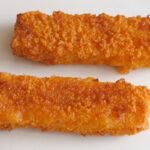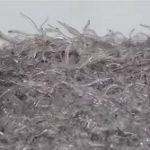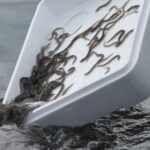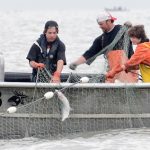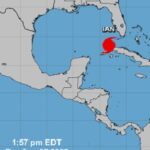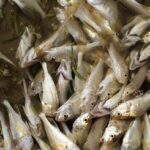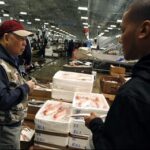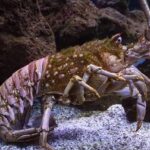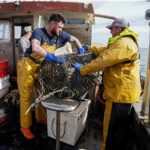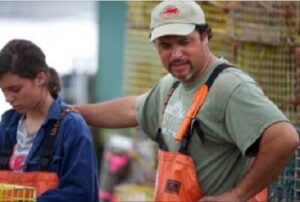Tag Archives: Gulf of Maine
WEEKEND FOCUS: Warming waters and the Gulf of Maine’s fate
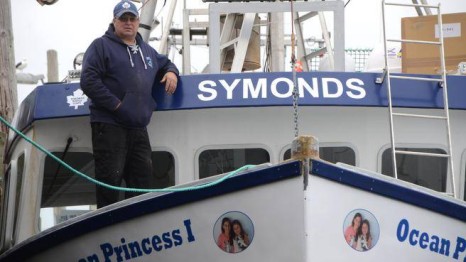 Headlines around that great body of water, cradled inside of Cape Sable Island to the north and Cape Cod in the south, screamed alarm this fall about a pending ecosystem collapse brought on by climate change. Most of those headlines linked back to a study by Andrew Pershing, chief scientific officer at the Gulf of Maine Research Institute, published in October in the journal Science. In it, Pershing attributes the non-recovery of cod stocks to the Gulf of Maine having warmed faster between 2004 and 2014 than 99 per cent of all other saltwater bodies on Earth. Read the rest here 09:38
Headlines around that great body of water, cradled inside of Cape Sable Island to the north and Cape Cod in the south, screamed alarm this fall about a pending ecosystem collapse brought on by climate change. Most of those headlines linked back to a study by Andrew Pershing, chief scientific officer at the Gulf of Maine Research Institute, published in October in the journal Science. In it, Pershing attributes the non-recovery of cod stocks to the Gulf of Maine having warmed faster between 2004 and 2014 than 99 per cent of all other saltwater bodies on Earth. Read the rest here 09:38
A fisherman’s doubt, and his love of the sea
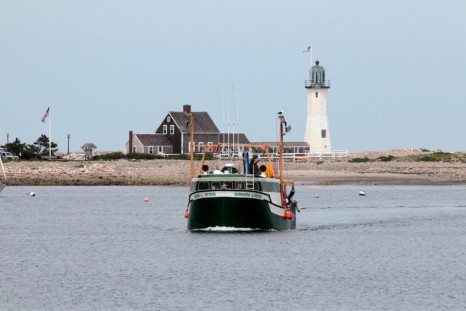 He is up before the dawn, and, a creature of steady habits, he heads for the seashore. It’s dark when Frank Mirarchi jumps into his black pickup truck, and dark still when he reaches Scituate Harbor. He parks on the town pier and stares at the ocean. But his 55-foot stern dragger is no longer moored there. Actually, the boat is there. But it’s no longer his. It was renamed last June after he sold it — a poignant punctuation point to Mirarchi’s half-century career as a commercial fisherman. Read the rest here 15:01
He is up before the dawn, and, a creature of steady habits, he heads for the seashore. It’s dark when Frank Mirarchi jumps into his black pickup truck, and dark still when he reaches Scituate Harbor. He parks on the town pier and stares at the ocean. But his 55-foot stern dragger is no longer moored there. Actually, the boat is there. But it’s no longer his. It was renamed last June after he sold it — a poignant punctuation point to Mirarchi’s half-century career as a commercial fisherman. Read the rest here 15:01
Not so fast on Atlantic marine monument – By Jon Williams
 An ongoing campaign led by large, well-funded environmental organizations is urging President Obama to use the 1906 Antiquities Act to designate parts of the Atlantic Ocean—such as Cashes Ledge in the Gulf of Maine and the New England Canyons and Seamounts—as marine National Monuments. In September, I had the privilege of testifying before House Natural Resources Committee Subcommittee on Water, Power and Oceans about the aspect of this proposal that seeks to exclude historic fisheries from the designated area. Read the rest here 18:47
An ongoing campaign led by large, well-funded environmental organizations is urging President Obama to use the 1906 Antiquities Act to designate parts of the Atlantic Ocean—such as Cashes Ledge in the Gulf of Maine and the New England Canyons and Seamounts—as marine National Monuments. In September, I had the privilege of testifying before House Natural Resources Committee Subcommittee on Water, Power and Oceans about the aspect of this proposal that seeks to exclude historic fisheries from the designated area. Read the rest here 18:47
Gulf warming study based on bad science, stakeholders say
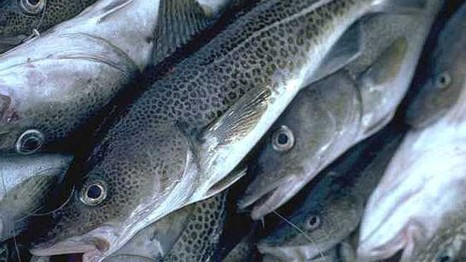 The study, performed by the Gulf of Maine Research Institute and appearing in the journal Science, concluded the Gulf of Maine’s surface water is warming more rapidly than 99.9 percent of the rest of the world’s oceans and that climate change is a contributing factor to the demise of the cod stock. “My first question was whether any part of the study started out to understand the true status of Gulf of Maine cod or if they just assumed that the data from the assessment — which we contend is consistently wrong — is fact,” said Vito Giacalone, policy director for the Gloucester-based Northeast Seafood Coalition. “I was told it was the latter.” Read the rest here 08:39
The study, performed by the Gulf of Maine Research Institute and appearing in the journal Science, concluded the Gulf of Maine’s surface water is warming more rapidly than 99.9 percent of the rest of the world’s oceans and that climate change is a contributing factor to the demise of the cod stock. “My first question was whether any part of the study started out to understand the true status of Gulf of Maine cod or if they just assumed that the data from the assessment — which we contend is consistently wrong — is fact,” said Vito Giacalone, policy director for the Gloucester-based Northeast Seafood Coalition. “I was told it was the latter.” Read the rest here 08:39
Scientists: Warming ocean factor in collapse of Gulf of Maine cod fishery
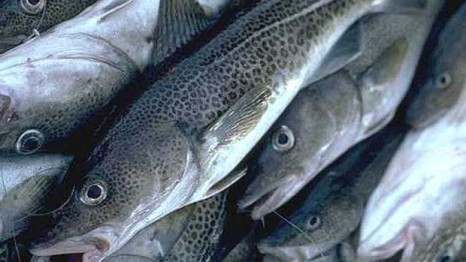 The scientists behind the Science report say the warming of the Gulf of Maine, which accelerated from 2004 to 2013, reduced cod’s capacity to rebound from fishing pressure. The report gives credence to the idea — supported by advocacy groups, fishing managers and even some fishermen — that climate change has played a role in cod’s collapse. The lead author of the study, Andrew Pershing of the Gulf of Maine Research Institute in Portland, said the gulf is warming at a rate 99 percent faster than anywhere else in the world, and as a result, too many of the fish aren’t living past age 4. Cod can live to be older than 20. Read the rest here 07:58
The scientists behind the Science report say the warming of the Gulf of Maine, which accelerated from 2004 to 2013, reduced cod’s capacity to rebound from fishing pressure. The report gives credence to the idea — supported by advocacy groups, fishing managers and even some fishermen — that climate change has played a role in cod’s collapse. The lead author of the study, Andrew Pershing of the Gulf of Maine Research Institute in Portland, said the gulf is warming at a rate 99 percent faster than anywhere else in the world, and as a result, too many of the fish aren’t living past age 4. Cod can live to be older than 20. Read the rest here 07:58
Warming waters a major factor in the collapse of New England cod, study finds
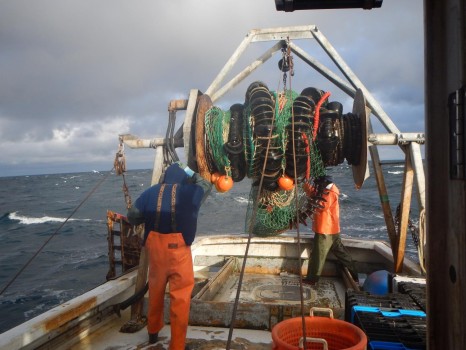 Pershing and colleagues from GMRI, the University of Maine, Stony Brook University, the Bigelow Laboratory for Ocean Sciences, and NOAA’s Earth System Research Laboratory, including the Cooperative Institute for Research in Environmental Sciences at the University of Colorado Boulder, found that increasing water temperatures reduce the number of new cod produced by spawning females. Their study also suggests that warming waters led to fewer young fish surviving to adulthood. Read the rest here 18:04
Pershing and colleagues from GMRI, the University of Maine, Stony Brook University, the Bigelow Laboratory for Ocean Sciences, and NOAA’s Earth System Research Laboratory, including the Cooperative Institute for Research in Environmental Sciences at the University of Colorado Boulder, found that increasing water temperatures reduce the number of new cod produced by spawning females. Their study also suggests that warming waters led to fewer young fish surviving to adulthood. Read the rest here 18:04
UNE professor receives $493,000 in NOAA grants to study fisheries
 A University of New England marine sciences professor was recently awarded two federal grants totaling more than $493,000 to fund studies aimed at improving the commercial fishing industry and the environment. The two grants from the National Oceanic and Atmospheric Administration will research ways to reduce the deaths of Atlantic cod accidentally caught in lobster traps in the Gulf of Maine and Dusky sharks unintentionally caught during commercial pelagic longline fishing. Read the rest here 18:19
A University of New England marine sciences professor was recently awarded two federal grants totaling more than $493,000 to fund studies aimed at improving the commercial fishing industry and the environment. The two grants from the National Oceanic and Atmospheric Administration will research ways to reduce the deaths of Atlantic cod accidentally caught in lobster traps in the Gulf of Maine and Dusky sharks unintentionally caught during commercial pelagic longline fishing. Read the rest here 18:19
It’s time for 1906 Antiquities Act to be drastically reformed or scrapped altogether.
 Clearly, the intent of creating these monuments has nothing to do with historical or cultural preservation. As Maine Gov. Paul LePage rightly noted, the designations would “serve only one purpose — excluding commercial fishing activity from certain segments of the ocean.” While the areas in question already enjoy a great deal of protection from destructive practices like trawling and dredging, environmental advocates are hopeful that a national monument would end all fishing activity by means of executive fiat. Read the rest here 11:24
Clearly, the intent of creating these monuments has nothing to do with historical or cultural preservation. As Maine Gov. Paul LePage rightly noted, the designations would “serve only one purpose — excluding commercial fishing activity from certain segments of the ocean.” While the areas in question already enjoy a great deal of protection from destructive practices like trawling and dredging, environmental advocates are hopeful that a national monument would end all fishing activity by means of executive fiat. Read the rest here 11:24
Many young fish moving north with adults as climate changes
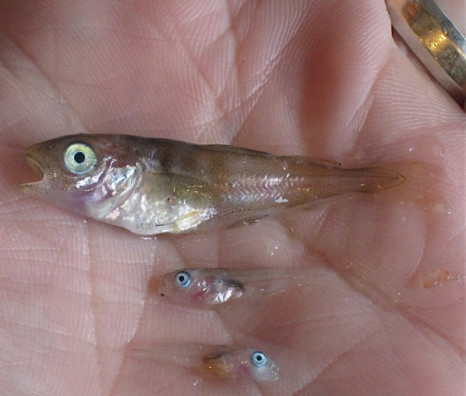 Researchers found that larval stages of 43 percent of the species studied changed distribution, while adult stages of 50 percent of the species shifted distribution over the same time period. Shifts were predominantly northwards or along the shelf for both life stages, which is expected given the warming ocean in the region. In addition to distribution changes, the study also found changes in spawning times and locations for some species, implying a link between changes in distribution and changes in the environment. Larvae of winter and spring species like yellowtail flounder generally shifted earlier in the season. Summer and fall species like monkfish shifted later in the season. Read the rest here 14:42
Researchers found that larval stages of 43 percent of the species studied changed distribution, while adult stages of 50 percent of the species shifted distribution over the same time period. Shifts were predominantly northwards or along the shelf for both life stages, which is expected given the warming ocean in the region. In addition to distribution changes, the study also found changes in spawning times and locations for some species, implying a link between changes in distribution and changes in the environment. Larvae of winter and spring species like yellowtail flounder generally shifted earlier in the season. Summer and fall species like monkfish shifted later in the season. Read the rest here 14:42
Fight the threat to Maine workers – Governor Paul R. LePage
 “A National Marine Monument putting Cashes Ledge and undersea canyons and seamounts in the Gulf of Maine off-limits to commercial fishing activity will affect Maine’s offshore lobstermen, tuna fishermen, herring fishermen and groundfish fishermen. Moreover, this comes on the heels of a roughly 10-year habitat amendment process at the New England Fishery Management Council. It looks like environmental interest groups that are unhappy with that process are now going to a higher authority to upend the result achieved by the council. Procedurally, this type of end-run is a terrible precedent. Read the rest here 11:26
“A National Marine Monument putting Cashes Ledge and undersea canyons and seamounts in the Gulf of Maine off-limits to commercial fishing activity will affect Maine’s offshore lobstermen, tuna fishermen, herring fishermen and groundfish fishermen. Moreover, this comes on the heels of a roughly 10-year habitat amendment process at the New England Fishery Management Council. It looks like environmental interest groups that are unhappy with that process are now going to a higher authority to upend the result achieved by the council. Procedurally, this type of end-run is a terrible precedent. Read the rest here 11:26
An Unnatural History of The McLobster
 From Robert Steneck’s home in South Bristol, Maine, his view reaches past the pale granite headlands at the mouth of the Damariscotta River to be swallowed by the open Atlantic. The word “pristine” tends to pop into the heads of visitors, he said, but he prefers a more objective description. “The Gulf of Maine is a highly simplified and arguably domesticated ecosystem,” Steneck, a marine ecologist with the University of Maine, explained. “If you put it that way, are you surprised that we have McLobsters?” Read the rest here 17:48
From Robert Steneck’s home in South Bristol, Maine, his view reaches past the pale granite headlands at the mouth of the Damariscotta River to be swallowed by the open Atlantic. The word “pristine” tends to pop into the heads of visitors, he said, but he prefers a more objective description. “The Gulf of Maine is a highly simplified and arguably domesticated ecosystem,” Steneck, a marine ecologist with the University of Maine, explained. “If you put it that way, are you surprised that we have McLobsters?” Read the rest here 17:48
Pew Enviro Groups eye Marine National Monuments protections for Cashes Ledge, canyons, seamounts off Cape Cod
 Enviro groups this week plan to call for sprawling areas in the Gulf of Maine and off Cape Cod and Rhode Island to be declared the first “marine national monument” on the eastern seaboard. A January 2009 presidential proclamation established three Pacific Marine National Monuments. Now the Conservation Law Foundation (CLF) and partners like the National Geographic Society, Pew Charitable Trusts and the Natural Resources Defense Council are seeking protections for the Closed Area in the Gulf of Maine and the New England Canyons and Seamounts off the Cape – areas CLF describes as “deep sea treasures.” Read the rest here 16:17
Enviro groups this week plan to call for sprawling areas in the Gulf of Maine and off Cape Cod and Rhode Island to be declared the first “marine national monument” on the eastern seaboard. A January 2009 presidential proclamation established three Pacific Marine National Monuments. Now the Conservation Law Foundation (CLF) and partners like the National Geographic Society, Pew Charitable Trusts and the Natural Resources Defense Council are seeking protections for the Closed Area in the Gulf of Maine and the New England Canyons and Seamounts off the Cape – areas CLF describes as “deep sea treasures.” Read the rest here 16:17
Maine Department of Marine Resources gets $256 Thousand for trawl survey from NOAA
 The survey gathers important data on the groundfish and lobster populations in near shore waters in the Gulf of Maine from the Massachusetts coast to the Canadian border. The Maine-New Hampshire Inshore Trawl Survey is a collaborative research project among DMR, the New Hampshire Fish and Game Department and commercial fishermen. Surveys are conducted twice a year, in the spring and fall, using a commercial fishing vessel. Read the rest here 13:28
The survey gathers important data on the groundfish and lobster populations in near shore waters in the Gulf of Maine from the Massachusetts coast to the Canadian border. The Maine-New Hampshire Inshore Trawl Survey is a collaborative research project among DMR, the New Hampshire Fish and Game Department and commercial fishermen. Surveys are conducted twice a year, in the spring and fall, using a commercial fishing vessel. Read the rest here 13:28
Lobstermen play waiting game while early prices spike, And wait they must!
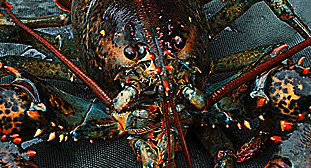 Maine’s lobster industry is gearing up for another big year as the state’s 4,500 commercial fishermen wait for lobsters to migrate to the coast and shed the hard shells they’ve been carrying all winter. “The old saying is: ‘The weather gets better before the lobster catch does,’” he said. “It takes awhile for the water temperatures to warm up and for the lobsters to do their thing.” It all comes down to weather – not this weekend’s mostly sunny summer skies but the bitter cold of last winter that chilled the Gulf of Maine. Then a wave of storms in February mixed up the water column and drove those low temperatures at the surface down to lobster habitat at the bottom. Read the rest here
Maine’s lobster industry is gearing up for another big year as the state’s 4,500 commercial fishermen wait for lobsters to migrate to the coast and shed the hard shells they’ve been carrying all winter. “The old saying is: ‘The weather gets better before the lobster catch does,’” he said. “It takes awhile for the water temperatures to warm up and for the lobsters to do their thing.” It all comes down to weather – not this weekend’s mostly sunny summer skies but the bitter cold of last winter that chilled the Gulf of Maine. Then a wave of storms in February mixed up the water column and drove those low temperatures at the surface down to lobster habitat at the bottom. Read the rest here
Study unveils why Atlantic bluefin tuna suffer despite prey abundance
 In a paper in the journal Marine Ecology Progress Series titled “The paradox of the pelagics: why bluefin tuna can go hungry in a sea of plenty,” the seven authors outlined how the overall condition (fat content) of Atlantic bluefin tuna in the Gulf of Maine declined despite an abundance of Atlantic herring — their preferred prey. The population of Atlantic herring has increased over the past two decades suggesting that foraging conditions should have been favorable for bluefin tuna. A decline in bluefin tuna condition despite,,, Read the rest here 10:26
In a paper in the journal Marine Ecology Progress Series titled “The paradox of the pelagics: why bluefin tuna can go hungry in a sea of plenty,” the seven authors outlined how the overall condition (fat content) of Atlantic bluefin tuna in the Gulf of Maine declined despite an abundance of Atlantic herring — their preferred prey. The population of Atlantic herring has increased over the past two decades suggesting that foraging conditions should have been favorable for bluefin tuna. A decline in bluefin tuna condition despite,,, Read the rest here 10:26
‘Now I’m at half what I’d normally be at.’ Cod restriction’s rip the charter fleet
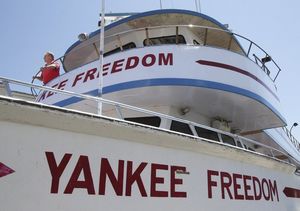 It isn’t just the Northeast commercial groundfishing fleet that is struggling under the weight of the more restrictive federal fishing regulations that have completely taken cod off the table in the Gulf of Maine. The tendrils of those new regulations have reached the charter and for-hire fishing operators, who now try to combat both the reality — no cod — and the perception — no other groundfish species is worth the time and expense of a charter trip that have been generated by increasingly restrictive regulations instituted for the 2015 fishing season. Read the rest here 08:50
It isn’t just the Northeast commercial groundfishing fleet that is struggling under the weight of the more restrictive federal fishing regulations that have completely taken cod off the table in the Gulf of Maine. The tendrils of those new regulations have reached the charter and for-hire fishing operators, who now try to combat both the reality — no cod — and the perception — no other groundfish species is worth the time and expense of a charter trip that have been generated by increasingly restrictive regulations instituted for the 2015 fishing season. Read the rest here 08:50
NEFMC Approve Some Habitat Changes – blocks no-fishing zone for scientific research on Stellwagen Bank
Federal fishery regulators say they will keep much-debated protections for Cashes Ledge in the 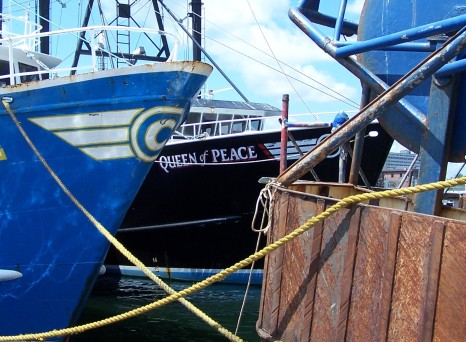 in place as part of a broad effort to alter the scope of New England’s fishing grounds. Peter Baker, director of northeast U.S. Oceans for Pew Charitable Trusts, said that with the recent approvals, the council remains “on a course to eliminate thousands of square miles of important fish habitat areas” in favor of commercial fishing concerns. He said the council has ignored conservationists’ (shrugs shoulders),,, Read the rest here 20:48
in place as part of a broad effort to alter the scope of New England’s fishing grounds. Peter Baker, director of northeast U.S. Oceans for Pew Charitable Trusts, said that with the recent approvals, the council remains “on a course to eliminate thousands of square miles of important fish habitat areas” in favor of commercial fishing concerns. He said the council has ignored conservationists’ (shrugs shoulders),,, Read the rest here 20:48
Some better news for haddock, and fishermen. Really?
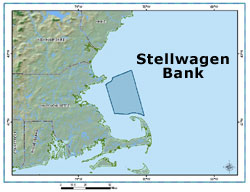 THE GLOOMY clouds hanging over New England’s fisheries lifted a bit last week when the NOAA reported that several species were no longer overfished off US shores, including haddock in the Gulf of Maine. Regardless, a battle continues between the fishing industry, environmentalists, and regulators as to the extent that some types of fishing affect the ocean floor’s ecosystem. In a new effort to study those impacts, the New England Fishery Management Council is expected to vote Thursday on creating a 55-square-nautical-mile reference research area. Read the rest here 07:44
THE GLOOMY clouds hanging over New England’s fisheries lifted a bit last week when the NOAA reported that several species were no longer overfished off US shores, including haddock in the Gulf of Maine. Regardless, a battle continues between the fishing industry, environmentalists, and regulators as to the extent that some types of fishing affect the ocean floor’s ecosystem. In a new effort to study those impacts, the New England Fishery Management Council is expected to vote Thursday on creating a 55-square-nautical-mile reference research area. Read the rest here 07:44
Scallop Sparks flying in advance of New England Fishery Management Council meeting
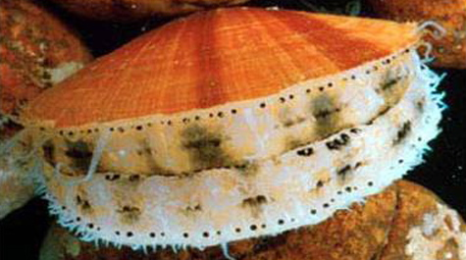 The scallop industry is on high alert over next week’s meeting of the New England Fishery Management Council after a long warning letter was sent to the council by NOAA
The scallop industry is on high alert over next week’s meeting of the New England Fishery Management Council after a long warning letter was sent to the council by NOAA Fisheries Regional Administrator John Bullard. The council’s Habitat Committee has issued recommendations that fishing restrictions be lifted on several areas of Georges Bank, the Gulf of Maine and the South Channel. But Bullard, backed by his agency’s scientific staff, said he believes that the relaxing of the restrictions would set back the effort to nurse fish stocks back to health. Read the rest here 22:03
Massachusetts: Cod fishing restrictions to remain in place for another year
 Federal regulations implemented in November to restrict cod fishing in the Gulf of Maine will remain in place for at least another year, the state Division of Marine Fisheries announced Wednesday.Additionally, the state Division of Marine Fisheries has reduced the commercial trip limit for Gulf of Maine cod from 800 to 200 pounds for all state and federal permit holders fishing in state waters. Read the rest here 14:32
Federal regulations implemented in November to restrict cod fishing in the Gulf of Maine will remain in place for at least another year, the state Division of Marine Fisheries announced Wednesday.Additionally, the state Division of Marine Fisheries has reduced the commercial trip limit for Gulf of Maine cod from 800 to 200 pounds for all state and federal permit holders fishing in state waters. Read the rest here 14:32
The Gulf of Maine: Poster Child for Global Weirding?
 Since it’s snowing this evening, again, I though I’d write something on climate, which I know is not weather. As so often, the great state of Maine, seemingly peripheral, turns out to be central, in this case because of the Gulf that bears its name. Gulf of Maine Council on the Marine Environment (PDF): So, rather than a definitive theory of everything, this post is one citizen’s effort to try to make sense of the situation. So, to do that, I’ll ask, first, who believes the Gulf of Maine is warming? Read the rest here 08:20
Since it’s snowing this evening, again, I though I’d write something on climate, which I know is not weather. As so often, the great state of Maine, seemingly peripheral, turns out to be central, in this case because of the Gulf that bears its name. Gulf of Maine Council on the Marine Environment (PDF): So, rather than a definitive theory of everything, this post is one citizen’s effort to try to make sense of the situation. So, to do that, I’ll ask, first, who believes the Gulf of Maine is warming? Read the rest here 08:20
NEFMC giving $450K to fish research projects
 The New England Fishery Management Council is funding the work. One project will seek to develop ways for cod and haddock fishermen to avoid accidentally catching flatfish in Georges Bank. Another will assess the performance of fishing gear designed to avoid accidental catch of windowpane flounder. A third project seeks to improve capture and handling methods for haddock discarded in recreational Gulf of Maine fisheries. A final project will assess recreational haddock discard mortality on Jeffreys Ledge. Read the rest here 06:54
The New England Fishery Management Council is funding the work. One project will seek to develop ways for cod and haddock fishermen to avoid accidentally catching flatfish in Georges Bank. Another will assess the performance of fishing gear designed to avoid accidental catch of windowpane flounder. A third project seeks to improve capture and handling methods for haddock discarded in recreational Gulf of Maine fisheries. A final project will assess recreational haddock discard mortality on Jeffreys Ledge. Read the rest here 06:54
Don’t give up on groundfishing just yet
 “Why should we help those who destroyed their own fishery?” This is the question that is usually trotted out when there is a debate about allowing lobster bycatch on groundfish boats here in Maine. (Bycatch is the term that refers to species incidentally caught in fishing gear in addition to the primary targeted species.) There are other instances when this question is raised, usually when the phrase “struggling groundfish fleet” is incorporated into the conversation about the various problems associated with . Read the rest here 09:41
“Why should we help those who destroyed their own fishery?” This is the question that is usually trotted out when there is a debate about allowing lobster bycatch on groundfish boats here in Maine. (Bycatch is the term that refers to species incidentally caught in fishing gear in addition to the primary targeted species.) There are other instances when this question is raised, usually when the phrase “struggling groundfish fleet” is incorporated into the conversation about the various problems associated with . Read the rest here 09:41
Is the tasty blue crab’s natural range creeping north?
 Ephemeral populations of blue crabs have been documented previously in the Gulf of Maine. Johnson notes that in the 1950s blue crabs were observed in the gulf during a time of warmer waters. But once the waters returned to average temperatures, the crabs disappeared. “It’s too early to determine if the current blue crab population in the Gulf of Maine is permanent or ephemeral,” Johnson says. “However, models predict an increasing warming of the world’s oceans and recent observations of blue crabs may be a crystal ball into the future ecology of the Gulf of Maine.” Read the rest here 09:37
Ephemeral populations of blue crabs have been documented previously in the Gulf of Maine. Johnson notes that in the 1950s blue crabs were observed in the gulf during a time of warmer waters. But once the waters returned to average temperatures, the crabs disappeared. “It’s too early to determine if the current blue crab population in the Gulf of Maine is permanent or ephemeral,” Johnson says. “However, models predict an increasing warming of the world’s oceans and recent observations of blue crabs may be a crystal ball into the future ecology of the Gulf of Maine.” Read the rest here 09:37
NOAA and the fishermen: Across the great divide?
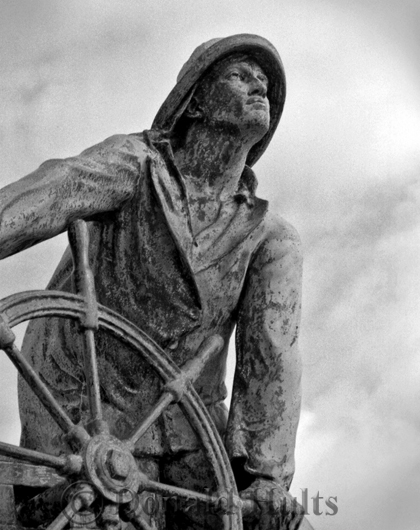 The sampling remains microscopically thin, so only time will tell whether the compromise forged by the commercial fishing industry and NOAA Fisheries on the Gulf of Maine interim cod measures will stand as a template for the future. Even given that uncertainty of what lies beyond the horizon, the lack of rancor in modifying the emergency cod measures was a refreshing departure from the antagonistic tango federal regulators and the fishermen have danced in the past. Read the rest here 08:59
The sampling remains microscopically thin, so only time will tell whether the compromise forged by the commercial fishing industry and NOAA Fisheries on the Gulf of Maine interim cod measures will stand as a template for the future. Even given that uncertainty of what lies beyond the horizon, the lack of rancor in modifying the emergency cod measures was a refreshing departure from the antagonistic tango federal regulators and the fishermen have danced in the past. Read the rest here 08:59
Drilling group unlikely to tap Gulf of Maine for oil and gas
A coalition of U.S. governors pushing for more offshore oil and gas drilling turned heads in Maine last month when it announced that Gov. Paul LePage had become a member. But LePage’s participation doesn’t foreshadow oil rigs off the Maine coast – the latest federal research suggests that the Gulf of Maine lacks the right geology to hold commercial deposits of oil or natural gas. Read the rest here 08:42
Gulf of Maine Shrimp counting to help track egg hatch
While data from this limited sampling project won’t help estimate current stock abundance as do the more comprehensive surveys conducted annually by the National Marine Fisheries Service, 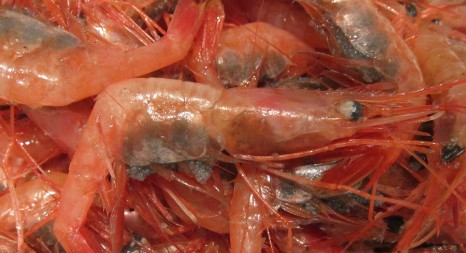 , it will help managers track the timing of egg hatch, size and gender and developmental stage of the shrimp. Four trawlers from Maine and Massachusetts and five Maine-based trappers have been selected to collect samples in four regions in the Gulf of Maine. Read the rest here 17:18:
, it will help managers track the timing of egg hatch, size and gender and developmental stage of the shrimp. Four trawlers from Maine and Massachusetts and five Maine-based trappers have been selected to collect samples in four regions in the Gulf of Maine. Read the rest here 17:18:
Regulations have done little to boost cod in Gulf of Maine: Lobster management offers clear direction
 Colonial America’s first true industry, groundfishing, has followed the path of many others. Technology improved as the industrial revolution took hold — it kept improving afterward — and a growing population of fishermen, both domestic and foreign, became more productive as they pursued cod, haddock and other species found near the ocean floor. Yada yada yada! Read the rest here 21:20
Colonial America’s first true industry, groundfishing, has followed the path of many others. Technology improved as the industrial revolution took hold — it kept improving afterward — and a growing population of fishermen, both domestic and foreign, became more productive as they pursued cod, haddock and other species found near the ocean floor. Yada yada yada! Read the rest here 21:20
Conflict looms over effort to reopen protected Gulf of Maine fishing ground
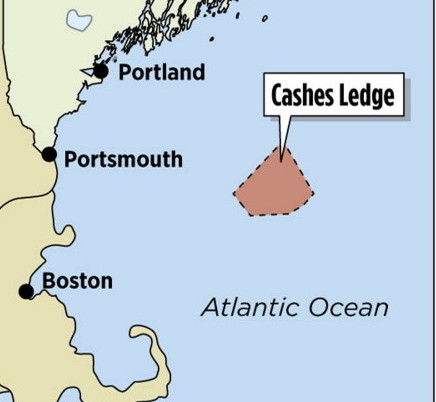 Under the “preferred option” being considered by the council, the more than 500-square-mile closure zone would shrink by roughly 70 percent. All mobile “bottom-tending” fishing gear – such as draggers and trawlers that can disturb the sea floor – would remain banned around Ammen Rock and most of the ledge proper. But fishermen could resume targeting haddock, cod, pollock and other groundfish in surrounding mudflats that the council deemed “less vulnerable to accumulating adverse effects.” Read the rest here 08:10
Under the “preferred option” being considered by the council, the more than 500-square-mile closure zone would shrink by roughly 70 percent. All mobile “bottom-tending” fishing gear – such as draggers and trawlers that can disturb the sea floor – would remain banned around Ammen Rock and most of the ledge proper. But fishermen could resume targeting haddock, cod, pollock and other groundfish in surrounding mudflats that the council deemed “less vulnerable to accumulating adverse effects.” Read the rest here 08:10
































